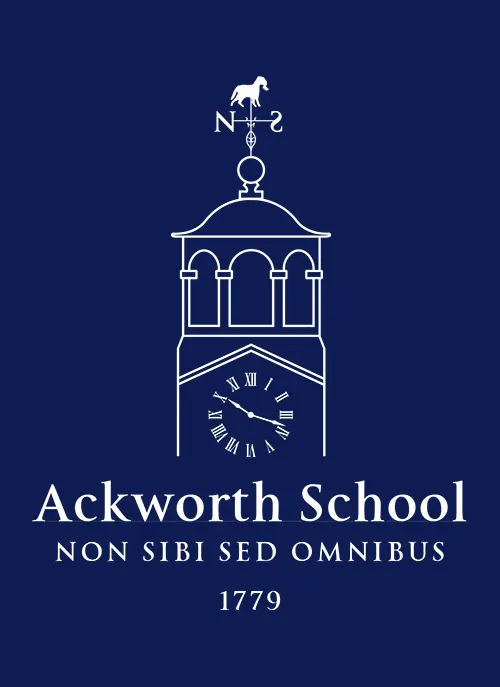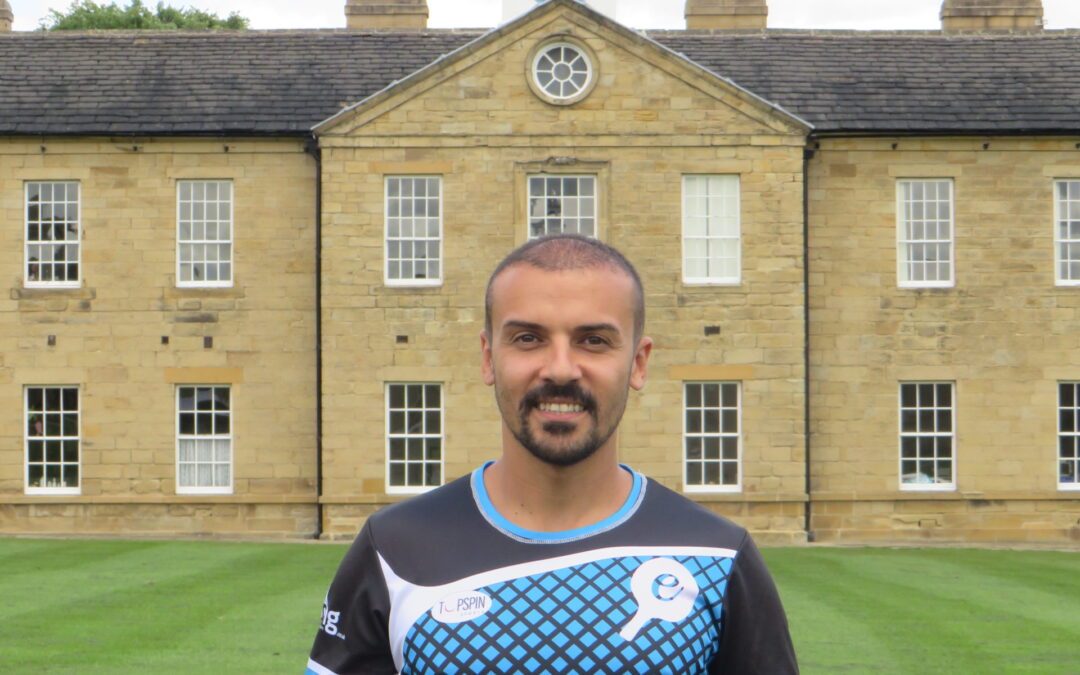
Jul 24, 2020 | Ackworth School, table tennis
Ackworth School’s new head table tennis coach, Eli Baraty has found himself flying – and living – all over the globe in pursuit of greatness. The renowned table tennis coach has a CV packed with coaching and playing successes and is now looking to drive Ackworth School into becoming an internationally recognisable table tennis powerhouse.

Ackworth School is pleased to announce its new Table Tennis Academy Coach, Eli Baraty, who joins the school in September.
An accomplished table tennis player, Eli has competed at the highest levels in the German league and represented England in Sweden and Switzerland.
The experience of the world stage has led Eli to work closely with five international set-ups, helping coach their best players. Simply put, this is why Eli has a preceding reputation as a high-performance coach; twenty of the players that have come through his academy or that he has coached at various schools, have gone on to be recognised international talents.
Schools coaching is where Eli really made his mark. In an academy just outside of London, Eli built up a then non-existent table tennis programme into a significant force to be reckoned with. Under his expert tutelage, his team served up no less than eight National Schools Championships and finished sixth in the World School Games – an unsurpassed British record.
Eli is quick to assert that he doesn’t want win-at-all-costs players; he champions a much more familial atmosphere:
“I’ve always built a family feel. So, it’s not always about, ‘OK, we’re machines, we’re going to go out there and beat everyone and walk around like we don’t care about anyone’.
“We care about one another; we have great camaraderie and we build that lovely family feel.”
A breath of fresh air blows through Baraty’s academies; his training is far removed from the more traditional one size fits all approach. It’s bespoke, holistic. Eli is much of the mind that a player can be much more than simply the sum of their parts. A 6’7” 250lb heavyweight boxer wouldn’t be trained in the same manner as a lightweight, so why does this thinking not extend to all forms of coaching? Eli thinks it should.
“I’m very holistic, I try to take into account each player’s specific needs.
“For example, I coach somebody who’s No. 5 in England at the moment. He’s nearly 7’! So, I have to find solutions for him to compete and win at the highest levels.
“I’ve got players who are fast, heavy, tiny, whatever. I’m always looking for what suits the individual player’s needs.
“Some trainers can only cater for a certain type of player, someone who’ll listen to them. Someone who’s young, small and fast.”
Unapologetically ambitious, Eli envisions success at Ackworth School, not only for the Table Tennis Academy, but for the pupils themselves – using the sport as a foundation for personal betterment.
“It’s about life skills, it’s about teaching people to come together as a team and to be the best you can be inside the sport and out.
“It’s like, look how successful you are in table tennis, you can be that successful in life as long as you put that focus in”
As the new Table Tennis Academy coach, Eli believes the foundations are set for something great at Ackworth. He sees the School becoming a table tennis destination, a hub, an internationally recognisable name.
“I want it to be a place where players from across Europe start to come, where national teams come to train. I want the School to be seen as the place to come if you want to be an elite performer
“If you have that dream of being a top player within table tennis, then this is your opportunity.”
Lofty goals indeed, though coming from the demonstrable successes of his past, certainly not unachievable.

How it all started
It’s 1996. The playgrounds were awash with Pokémon cards. Europe’s eyes are on England as the likes of Gascoigne, Shearer and McManaman plied their trade on home soil in the first major international football tournament since the glory days of ‘66. Football had come home.
On one auspicious night though, a 14-year-old Eli Baraty was not at home, but was staying at a friend’s house. Earlier that day, he and his friend had rented the film Forrest Gump; unbeknownst to Eli that this film would spark a career in table tennis, they settled in.
Then it happened.
That table tennis scene. The one where he’s playing against himself with half the table up. Eli watched on in amazement:
“I watched it and I just fell in love with that table tennis scene.
“The amazing thing was my friend had a table as well, so as soon as I saw the movie I thought ‘Oh my God I’ve got to play’. I just remember playing against the table the whole night while he went to bed.”
Eli may not have been the most considerate house-guest, but he was a great table tennis player. Four short years later, Eli had moved to France, playing professionally.
Then the proud owner of a Vespa, Eli drove himself from London to France – quite the considerable achievement when you consider the scooter struggled to do much more than 30mph! It was in France that, following a frank discussion with his coach, Eli had somewhat of an existential crisis.
“My coach basically said, ‘Look, you’re never going to be world champion’ and he was right, it was true. It hit me hard and I thought, ‘If I can’t be world champion, I don’t want to play at all’.”
On his return to England, Eli was offered a chance to ‘give back to the sport’. At just 18-years-old, Eli had taken his few tentative first steps down the road of table tennis coaching.
This is not to say that Eli stopped playing, however. In 2015 he battled through to the final 32 of the World Championships, losing out to eventual tournament winner, the England No.3 and Commonwealth Games gold medallist, Andrew Baggaly.
Find out more about applying to join Ackworth School’s Table Tennis Academy here or by calling our Admissions team on 01977 233 620.
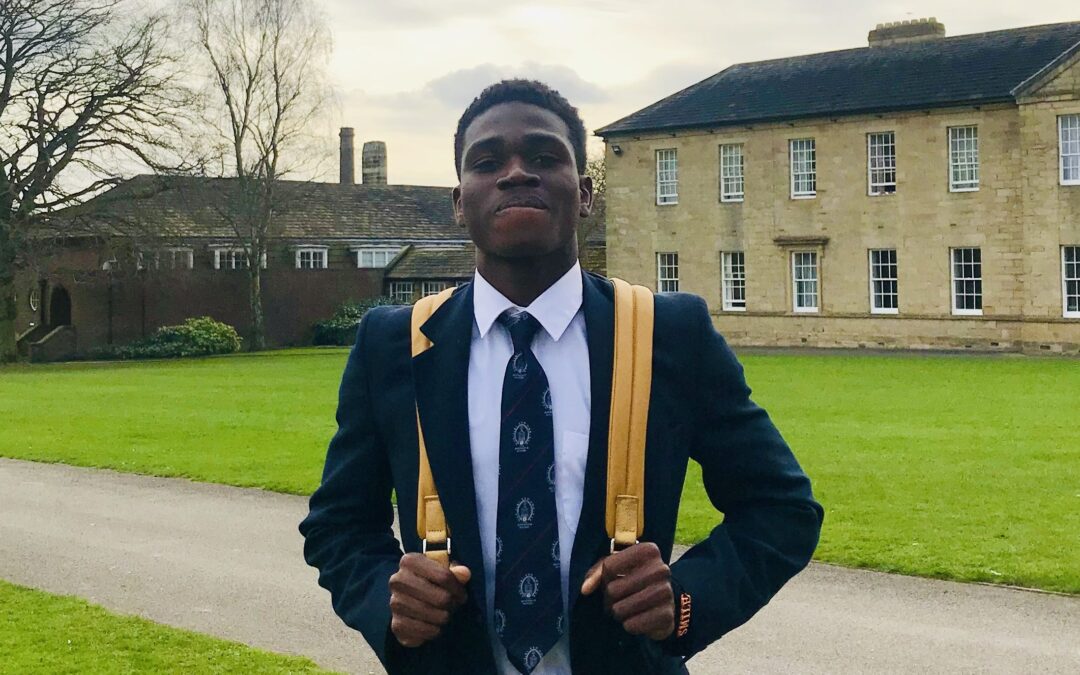
Jul 23, 2020 | Ackworth School
Lower 6th boarder Fakuma-Ilagha, from Nigeria, writes his poignant thoughts on equality and how racism can impact on young people.
The world seemed to be set ablaze by the aftermath of the incident that took place in Minneapolis, Minnesota, United States. On 25 May 2020. However, for most it was a matter of place and timing, as similar events had taken place in the past few years, with 2015 seeing more than 100 recorded cases of police brutality on black people which resulted in deaths, and even more unrecorded cases.
One would ask why these brutal events take place year in and year out? Why would someone would discriminate against another human being because of the colour of their skin, the texture of their hair or even the size of their hands?
Ultimately it all boils down to what we learn between the tender ages of 3 and 5 years old, as, during those years children begin to develop their personalities through interactions with their family. The morals of the family members will stick with the child for life but a child also learns from observations – what the child sees and hears.
In a situation where the father and mother spend a night out with their neighbours of a different race and cultural background, the parents may seem to be enjoying their night out but underneath there might be a different story…when the parents get home they might nag about how their neighbours eat, speak and dress. A stereotype then arises from this, where the parents conclude that this is just ‘how they all act’. Although the child has not said this, they have been listening and digesting all the remarks and concluded stereotypes. The real question now lays with how the child will treat other children of different ethnicities. There is only one answer to that: a child will display what he or she has been taught and influenced by.
Racism and prejudice affect us all, but in cases where young black students have to research the treatment of minority groups before they can apply for a school in that county, that is uncalled for!
Where parents have to lecture their sons and daughters to be ready and prepared for discrimination, that is sad. But when they tell their children to allow it most of the time, as responding will play to the stereotype of black people being too loud and easily angered, this causes an inferiority complex. The child does not feel like they are smart enough to understand a topic in school, because they feel all eyes are staring at them. When they go to a white, male dominated bar, or they just feel like they can’t try something new like skiing, then they feel strongly about the invisible barrier that has been inbuilt in them by society.
It is very easy to sideline all these issues if you are not affected by them, but it is also easy for the majority to become the minority with a change of location.
No one is immune to prejudice, racism and stereotypes or any form of discrimination. The only way to attain equality is for us to share in solidarity for one and another, educate ourselves and use this new-found knowledge to increase awareness in our families and communities.
My prayers go out to the families affected by racism.
Gelegu Fakuma-Ilagha
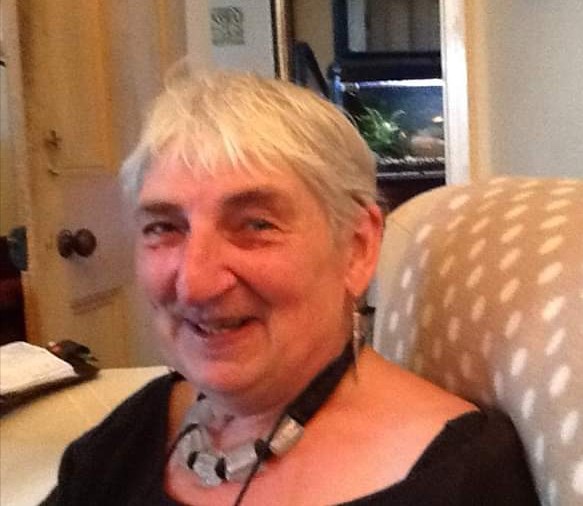
Jul 23, 2020 | Ackworth School, Quaker
Zephyrine has life-experience in abundance. From running a one-woman business for nearly two decades to volunteering within the prison industry, Zephyrine is happy to listen and share her experiences wherever and whenever they are needed.
Firstly, what is a Visiting Friend? The term dates back to the early years of Quakerism in the latter half of the 17th century, when Visiting Friends travelled between different communities, bringing news and ministry from other Friends (known as Quakers).
The dynamic Quaker faith has always tried to meet new challenges. Ackworth School has appointed Zephyrine to offer support and advice to all pupils, staff and parents who may seek a listening ear and support – drawing on the Quaker values of simplicity, truth, equality, peace and sustainability.
A friend (of the non-Quaker variety) once called Zephyrine a marmite person –you might love her or not immediately ‘get’ her. However, perhaps a better food based metaphor is that of marmalade; a little bit zany, heart-warming and a welcome addition. She’s certainly interested in hearing everybody’s story.
Zephyrine was born into a Quaker family, her father then a recent convert. She joined her siblings at Ackworth School which – as many others have experienced throughout the 240 years since Ackworth was founded – became her second home. Decades later, she served on Ackworth School Committee (the board of governors) for some years as Deputy Clerk.
Her mother’s encouragement to live life to the full included the advice that “nothing in this life goes wasted”. This, and the Quaker advice to “live adventurously”, shaped her attitude to life.
“I have followed the new paths at every fork in the road”.
After leaving Ackworth, Zephyrine planned to be an au pair in Germany for a year. Her father, hoping she would go to University, refused to pay the fare. Always a lateral thinker, Zephyrine approached London Quakers, who agreed to support her move. Being an au pair was her first role following the Quaker value of service, a motif which runs all through her life.
Zephyrine went on to study modern languages at the University of Wales, and later briefly worked as a dictionary editor. Following this, a stint on an Aberdeenshire croft, where she met a particularly ill-tempered goat.
Like many young people experiencing life, Zephyrine moved to London, where she chanced across another interesting job as a roadie-cum-cook for a two-piece girl band. “When I was asked if I could drive, I said, ‘No – at least, not legally!’” So she lugged band equipment to gigs and delivered their meals by bike!
Striving for excellence
Then came yet another “fork in the road”. After a chance question about fuchsia propagation to her older brother – a lecturer in horticulture, who replied “Go and find out for yourself!” – Zephyrine enrolled in a course at Horticulture College.
The horticulture course would bear fruit.
Zephyrine went on to work at the Icelandic State Horticulture College, before becoming a founding member of an innovative horticulture scheme for young adults with learning difficulties. She later set up, and for 18 years ran, her appropriately-named one-woman garden design and maintenance business Rose Among Thorns – Zephryine was named for the thornless Zephyrine Drouhin rose.
The multilingual holder of two master’s degrees, Zephyrine is always eager to expand her knowledge. Her first master’s (in Women’s Studies) was one mark short of a distinction; this did not sit well. “[It] annoyed me – I don’t get out of bed for anything less than a distinction.” Her dissertation was about early Quaker prophetesses. True to form, she completed a second MA, in Creative Writing – this time gaining a distinction. This led indirectly to a six-year stint as a University Health Research Associate, interviewing children, teenagers and older people in hospice and palliative care settings.
Zephyrine has took part in volunteer work for decades. “It’s a calling, something I felt I had to do,” she explains. She enjoys the relative freedom of volunteering, compared with more traditional paid work – preferable for someone with creative initiative and a predisposition to question ‘the rules’.
For 14 years Zephyrine was an independent prison monitor, a role which required her to visit a prison several times a month, to ensure that prisoners are treated with respect and decency. In addition to this she would attend and monitor serious incidents. Personal protection training gave her the confidence to enjoy the challenges of working in a prison setting: “I never felt scared in prisons. A well-run prison is a safe place.”
Zephyrine has also taught creative writing to homeless people, and currently volunteers with the Royal Voluntary Society. This work involves supporting patients with dementia on the frail elderly wards of her local hospital.
Volunteering enables her to draw on her Quaker beliefs to “give something back” to the community.
“Retire from what? Life? I don’t think so!”
Zephyrine’s horticultural experience is put to good use on her allotment, a no-dig ‘forest garden’ which does not always meet with some of the other gardeners approval. Weary of their criticism, she decided to quietly take on the allotment traditionalists by joining the Allotments Committee – to bring about “change from within”.
A woman with infinitely varied life experience who has “lived adventurously” and is always happy to listen, Zephyrine hopes soon to have the opportunity to contribute more fully to Ackworth’s pastoral care.
“”l am delighted to have been recently appointed as Ackworth’s Visiting Friend, to advise on and encourage the 240-year old School’s Quaker ethos. I also hope to be of service supporting students, staff and parents across the School community.”



